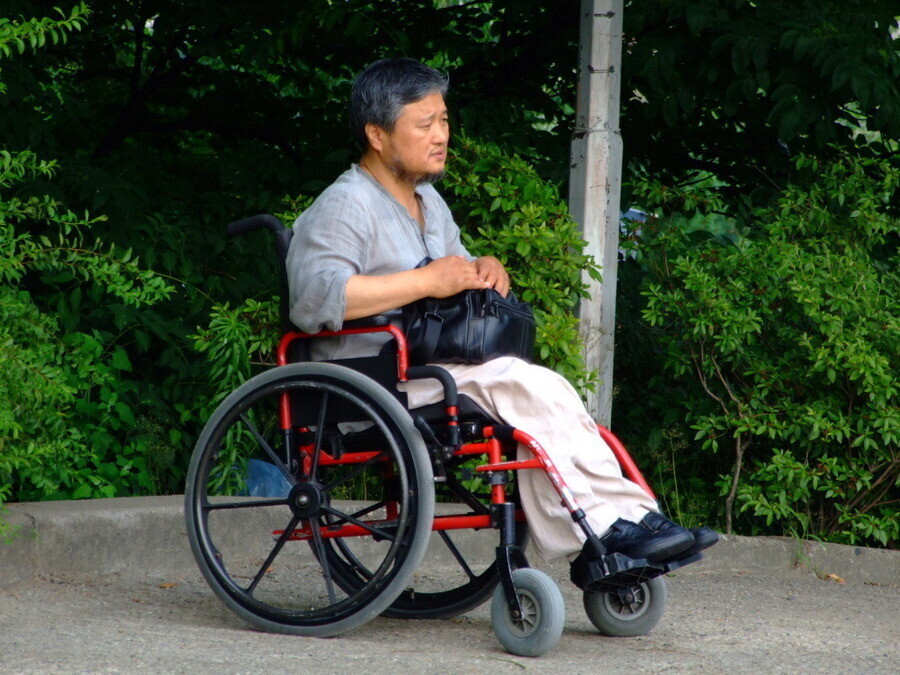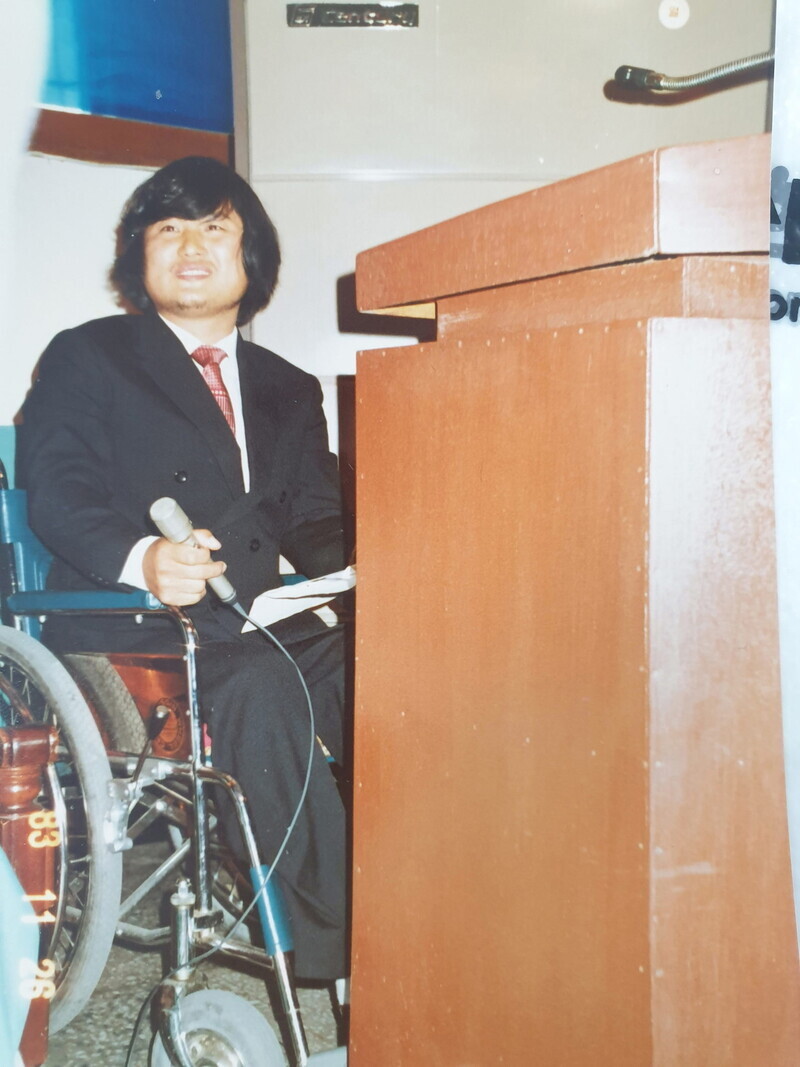hankyoreh
Links to other country sites 다른 나라 사이트 링크
Witness to history and survivor of Gwangju Uprising dies on same day as Chun Doo-hwan

Sighs of disbelief could be heard among those gathered at the wake of Lee Gwang-yeong, 68, in the Buk District of Gwangju on Wednesday.
“He’d fought his whole life against Chun Doo-hwan, and now he’s left us. God only knows how hard that was,” one of the visitors said.
Lee’s body had been found the day before in a reservoir in Gangjin County, South Jeolla Province, the place where he’d been born. Before his death, he wrote a short note on a piece of paper in his home in Iksan, North Jeolla Province. Considering that Lee drove himself to Gangjin, the police concluded that he had died by suicide.
Lee had been paralyzed from the waist down — the result of being shot in the spine by government troops sent to suppress the Gwangju Uprising in 1980.
“The last time we spoke on the phone was a week ago, so I was really shocked to hear the news yesterday. He’d always been in a lot of physical and mental pain, and then this,” said Lee Ji-hyeon, inaugural chairperson of an association for people injured in the Gwangju massacre.
“My brother had been in so much pain [recently] that he’d become dependent on painkillers,” said Lee Gwang-seong, 61-year-old younger brother to Gwang-yeong. “I think he went down this path because of his personality — he never wanted to be a burden on others.”
It’s presumed that Lee Gwang-yeong passed away around midnight on Tuesday. After Chun Doo-hwan died at 9 am that very morning, survivors of the Gwangju massacre drew attention to the tragic fate connecting the two.
Lee, then a Buddhist monk who went by Jingak, was on his way to Jeungsim Temple, near Gwangju, on May 19, 1980, when he took part in the uprising. He was helping transport injured people to the hospital on May 21 when he was struck in the spine by a bullet fired by the martial law troops.

During his hospital stay, Lee returned to secular life and started a family. He ran a comic book shop and supplied food to schools.
Lee played an active role in bringing to light the truth of the Gwangju Uprising and the slaughter of protesters. He helped set up the association for the injured in 1982 and testified in the Gwangju hearings at the National Assembly in 1988.
Along with late Catholic priest Rev. Cho Pius, Lee was one of the major figures who testified that martial law troops had fired on protesters from helicopters during the massacre. He was the first witness to testify in Chun’s first trial on charges of defaming the dead in May 2019.
“I was riding in a military jeep around 2 pm on May 21, 1980, when I witnessed helicopter gunfire while we were passing the roundabout at the Wolsan neighborhood in the Nam District of Gwangju,” he said.
Kang Seong-won, 59, one of the founding members of the association for the injured, had been close to Lee over the years. “He threw himself into the cause of uncovering the truth of the massacre and of bringing democracy [to Korea]. It’s so unfair to think he left us because he couldn’t bear the pain while Chun got to pass so peacefully.”
Almost every year, more massacre survivors end their lives, a troubling indication of the physical pain and psychological trauma they have suffered. Chung Byeong-gyun, who had been living alone, was found dead in September 2020.
According to a paper published in June by Kim Myeong-hee, a professor of sociology at Gyeongsang National University, 46 massacre survivors died by suicide between 1980 and 2019.
By By Kim Yong-hee, Gwangju correspondent
Please direct questions or comments to [english@hani.co.kr]
Editorial・opinion
![[Column] Season 2 of special prosecutor probe may be coming to Korea soon [Column] Season 2 of special prosecutor probe may be coming to Korea soon](https://flexible.img.hani.co.kr/flexible/normal/500/300/imgdb/original/2024/0426/3317141030699447.jpg) [Column] Season 2 of special prosecutor probe may be coming to Korea soon
[Column] Season 2 of special prosecutor probe may be coming to Korea soon![[Column] Park Geun-hye déjà vu in Yoon Suk-yeol [Column] Park Geun-hye déjà vu in Yoon Suk-yeol](https://flexible.img.hani.co.kr/flexible/normal/500/300/imgdb/original/2024/0424/651713945113788.jpg) [Column] Park Geun-hye déjà vu in Yoon Suk-yeol
[Column] Park Geun-hye déjà vu in Yoon Suk-yeol- [Editorial] New weight of N. Korea’s nuclear threats makes dialogue all the more urgent
- [Guest essay] The real reason Korea’s new right wants to dub Rhee a founding father
- [Column] ‘Choson’: Is it time we start referring to N. Korea in its own terms?
- [Editorial] Japan’s rewriting of history with Korea has gone too far
- [Column] The president’s questionable capacity for dialogue
- [Column] Are chaebol firms just pizza pies for families to divvy up as they please?
- [Column] Has Korea, too, crossed the Rubicon on China?
- [Correspondent’s column] In Japan’s alliance with US, echoes of its past alliances with UK
Most viewed articles
- 1‘We must say no’: Seoul defense chief on Korean, USFK involvement in hypothetical Taiwan crisis
- 2N. Korean delegation’s trip to Iran shows how Pyongyang is leveraging ties with Moscow
- 3[Column] Season 2 of special prosecutor probe may be coming to Korea soon
- 4‘Weddingflation’ breaks the bank for Korean couples-to-be
- 5[Column] Has Korea, too, crossed the Rubicon on China?
- 6[Editorial] New weight of N. Korea’s nuclear threats makes dialogue all the more urgent
- 7[Reportage] On US campuses, student risk arrest as they call for divestment from Israel
- 8Korea sees more deaths than births for 52nd consecutive month in February
- 9[Column] Park Geun-hye déjà vu in Yoon Suk-yeol
- 10[Guest essay] The real reason Korea’s new right wants to dub Rhee a founding father